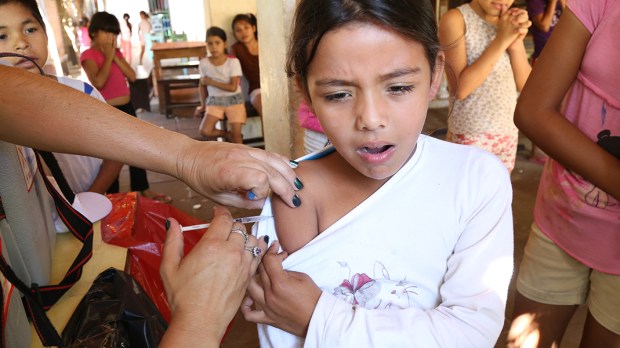A World Health Organization official is warning of continued outbreaks of measles in parts of Europe unless more people have their children vaccinated.
The WHO said that over 500 measles cases were reported for January in the organization’s European Region. “Measles continues to spread within and among European countries, with the potential to cause large outbreaks wherever immunization coverage has dropped below the necessary threshold of 95%,” a March 28 statement warned.
“With steady progress towards elimination over the past 2 years, it is of particular concern that measles cases are climbing in Europe,” says Dr Zsuzsanna Jakab, WHO Regional Director for Europe. “Today’s travel patterns put no person or country beyond the reach of the measles virus. Outbreaks will continue in Europe, as elsewhere, until every country reaches the level of immunization needed to fully protect their populations.”
Preliminary information for February indicates that the number of new infections is sharply rising, the statement said.
The largest current measles outbreaks in Europe, according to the WHO, are taking place in Romania and Italy.
“Romania has reported over 3400 cases and 17 deaths since January 2016 (as of 10 March 2017),” it said. “The majority of cases are concentrated in areas where immunization coverage is especially low.”
A WHO spokesman told Aleteia that the reasons some people are not vaccinated are “very complex and context-specific.”
“Some people do not fear measles; some people do not have equitable access to health services; some people do not trust their doctor; some people hesitate because they prefer homeopathic or other alternatives to vaccines and medicine,“ said Cristiana Salvi, communications Officer for WHO/Europe’s Health Emergencies & Communicable Diseases division.
Salvi said the spike is not thought to be attributable to the influx of immigrants and refugees from the Middle East and North Africa that Europe has experienced over the past couple of years.
“Most outbreaks of vaccine-preventable diseases such as measles occur in the [Europe] Region independently of refugee and migrant population movement,” she said. “Most of the refugees and migrants now arriving in Europe come from Middle Eastern countries where vaccines are widely accepted and coverage has traditionally been high.”
However, young children who have not yet been vaccinated because the vaccination programs in their home countries have been interrupted by civil unrest and war are most at risk, she added.
National Public Radio said that measles kills some 400 children a day throughout the world.
… measles is one of the most contagious diseases on Earth. One sick person spreads it to 18 others, on average. The virus literally floats around in clouds through the air, seeking out the unvaccinated. “You don’t even need to be in the same room with a sick person to catch measles,” [vaccine proponent Gavi] Berkley says. “If you were to leave a doctor’s office and someone came an hour later, that person could catch measles just from the virus left in the air.”

